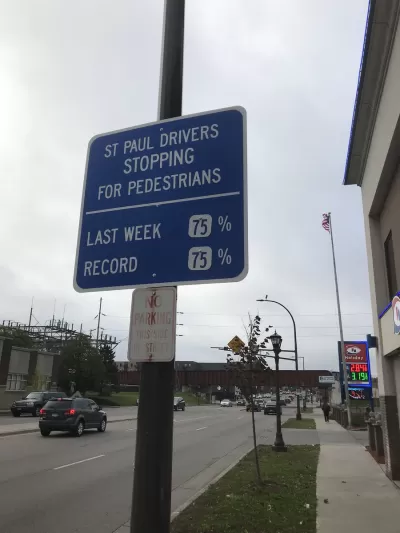A new study sheds light on what actually convinces drivers to slow down and stop for pedestrians.

Angie Schmitt reports on the findings of an analysis by Nichole Morris, director of the HumanFIRST Laboratory at the University of Minnesota, of drivers yielding at crosswalks around St. Paul.
Morris and her team initially found yielding rates were dreadful: Only 32 percent of drivers stopped. But they were able to improve that number more than double that using “human factors psychology,” which is focused on altering group behavior.
Human factors psychology includes other jargon-y sounding terms like "social norming" and "implied surveillance." But Schmitt interviews Morris in person to clarify more of the concepts behind this tool for convincing drivers to slow and even stop for the safety and right of way of pedestrians.
FULL STORY: To Get Drivers to Yield, St. Paul Uses Psych Trick

Planetizen Federal Action Tracker
A weekly monitor of how Trump’s orders and actions are impacting planners and planning in America.

Maui's Vacation Rental Debate Turns Ugly
Verbal attacks, misinformation campaigns and fistfights plague a high-stakes debate to convert thousands of vacation rentals into long-term housing.

Restaurant Patios Were a Pandemic Win — Why Were They so Hard to Keep?
Social distancing requirements and changes in travel patterns prompted cities to pilot new uses for street and sidewalk space. Then it got complicated.

In California Battle of Housing vs. Environment, Housing Just Won
A new state law significantly limits the power of CEQA, an environmental review law that served as a powerful tool for blocking new development.

Boulder Eliminates Parking Minimums Citywide
Officials estimate the cost of building a single underground parking space at up to $100,000.

Orange County, Florida Adopts Largest US “Sprawl Repair” Code
The ‘Orange Code’ seeks to rectify decades of sprawl-inducing, car-oriented development.
Urban Design for Planners 1: Software Tools
This six-course series explores essential urban design concepts using open source software and equips planners with the tools they need to participate fully in the urban design process.
Planning for Universal Design
Learn the tools for implementing Universal Design in planning regulations.
Heyer Gruel & Associates PA
JM Goldson LLC
Custer County Colorado
City of Camden Redevelopment Agency
City of Astoria
Transportation Research & Education Center (TREC) at Portland State University
Jefferson Parish Government
Camden Redevelopment Agency
City of Claremont





























